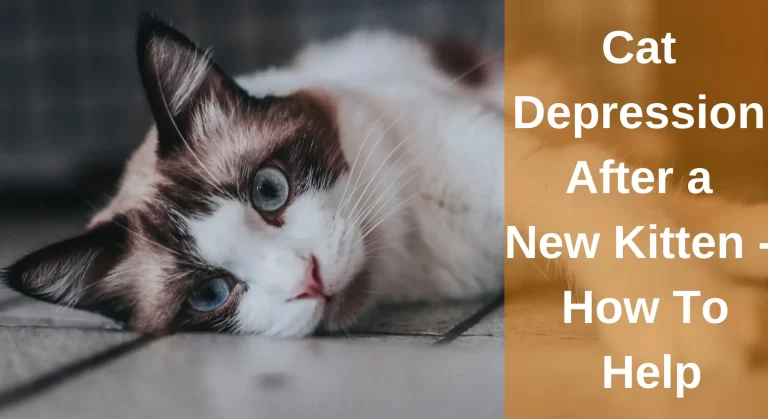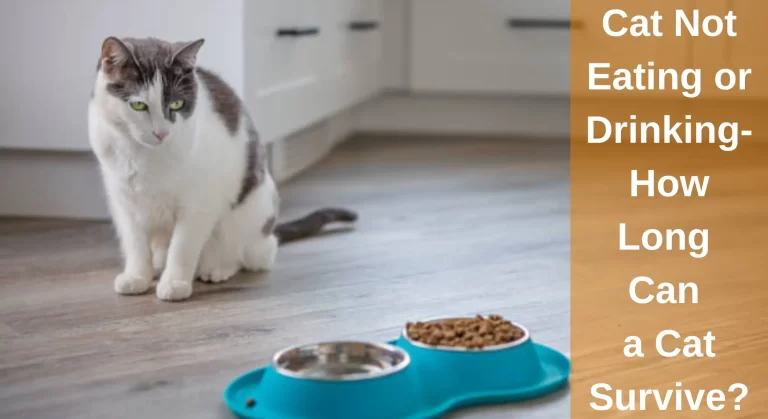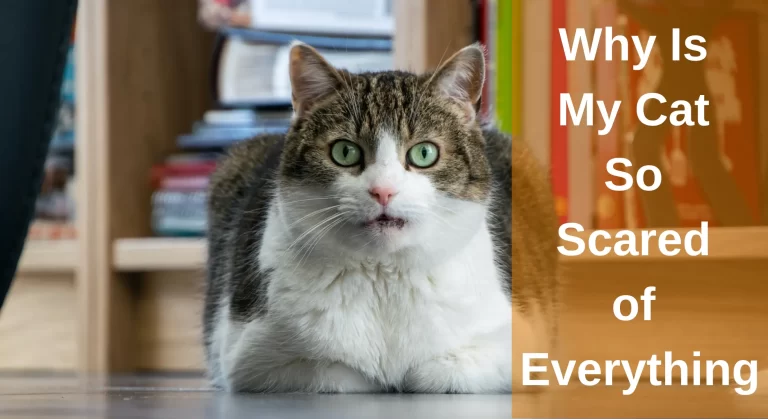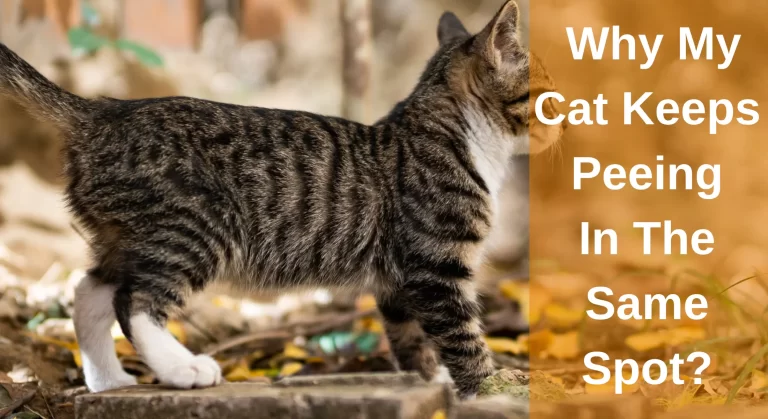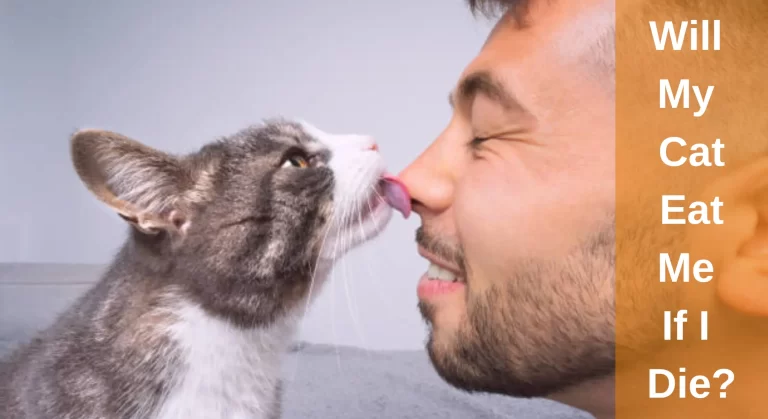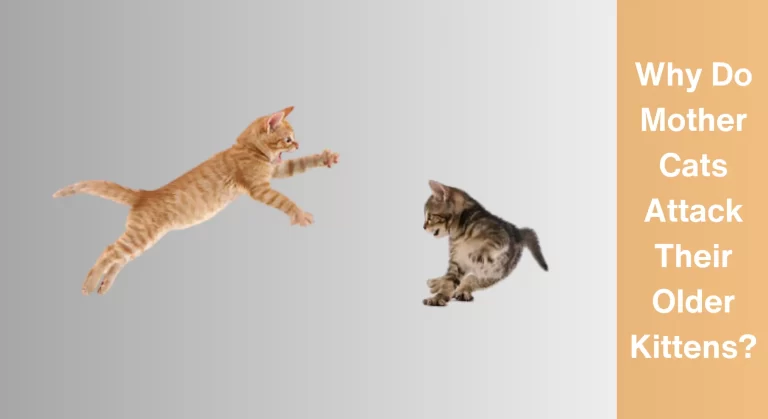Why Does My Cat Nibble My Fingers? And How to Stop
As cat owners, we all know that our feline friends can have some peculiar habits. One of these habits that might have left you puzzled is when your cat nibbles on your fingers you might wonder what is wrong with them. Did I do something wrong? Why does my cat nibble my fingers? While this behaviour may seem harmless, it can be uncomfortable or even painful. Some cats may prefer to chew on plastic, while others may find your fingers to be rather appetising.
In most cases, cats chew on your hands out of affection to make you play with them. They will also bite your fingers if they are teething or feeling stressed. Petting your cat too much also causes it to bite your fingers, which is the kitty’s way of saying, “Enough!”
The first step in stopping your cat from biting on your fingers or changing your behaviour so that it never reaches that point is to identify the exact source of the problem. The following solutions will help you to prevent your cat from chewing on your fingers.
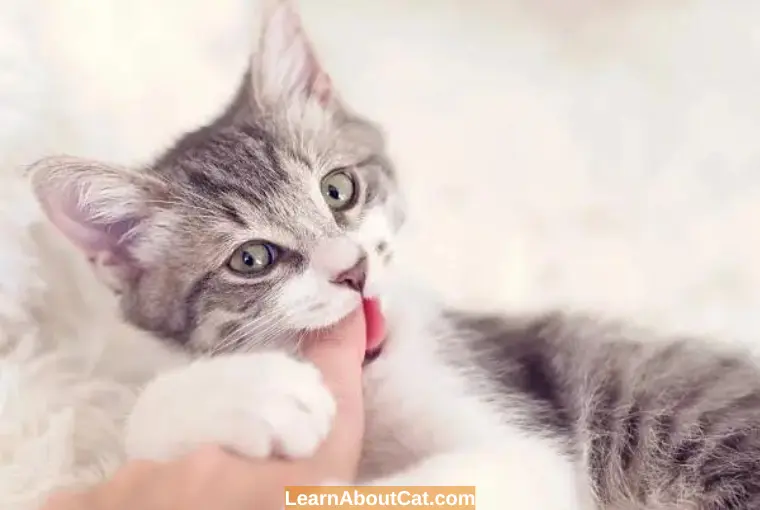
What Does it Mean When a Cat Nibbles on Your Fingers?
Before diving into the reasons why cats nibble on fingers, it is important to understand what this behaviour means. When a cat nibbles on your fingers, they are using its teeth to gently bite and release, often in a rhythmic motion.
This behaviour is different from biting, which is usually done with force and aggression. Finger nibbling can also be accompanied by licking or suckling.
Reasons Why Does My Cat Nibble My Fingers
Understanding why your cat is nibbling on your fingers can help you address the behaviour and make both you and your cat more comfortable.
There are several reasons why cats nibble on fingers. Here are the most common:
1. They’re Playing
Cats like playing, but occasionally this may turn into biting. When domestic cats play, they frequently practise the hunting techniques they would employ if they were living in the wild. Even if it’s a toy mouse, no amount of domestication will stop your cat from wanting to pounce on and bite its victim.
A cat nibbling your fingers indicates that it would like to play with you. If this is the case, your cat will usually nip you and then run away with a playful expression on its face, leading you towards their toys or bringing one to you.
However, if your cat is biting your fingers aggressively, it may be because they perceive your hand as a toy. This could lead to unintentional scratches or bites, which can be harmful. So it’s crucial to discourage this behaviour and redirect your cat’s attention to their toys.
It is imperative that pet owners exercise caution when it comes to permitting their feline friends to chew on them, even in a playful manner. To ensure that the cat understands what is acceptable and what is not, consistency in interactions is paramount.
If a cat nibbles on its owner while playing, the optimal course of action is to either remove one’s hand or oneself from the situation for several minutes. During this time, it is essential to completely disregard the cat.
Do not converse with or even look at the cat. This is the exclusive way to teach the cat that biting is inappropriate conduct. Following a brief hiatus, the play session can resume, but it is advisable to divert the cat’s attention to a toy instead of one’s hand.
It is crucial to bear in mind that consistency is the linchpin of training a cat to engage in play without biting. With tenacity and patience, one can coach their cat to play without having to resort to biting.
2. They Were Weaned Young
At around 8 weeks of age, the majority of kittens will start weaning on their own. However, if a kitten is weaned earlier or abruptly separated from its mother, it may mimic suckling behaviour to seek comfort. While some cats prefer to use a soft blanket, others may grab onto fingers or hands instead.
If your cat consistently suckles on inappropriate objects, it’s advisable to seek advice from a veterinarian or a cat behaviourist. Sometimes, offering your cat a soft toy or blanket to suckle on can be a helpful alternative.
It’s worth noting that this behaviour is a self-soothing mechanism for cats and not necessarily something you should aim to prevent entirely.
3. They’re Showing their Affection
When your feline friend gently holds your finger in its mouth and applies light pressure, it may be a display of trust. Despite having sharp teeth that could draw blood, your cat chooses to show affection without causing any harm. This action is a clear indication that your kitty has faith in you and that you share a special bond.
If you pay great attention to your cat’s body language and behaviour, you’ll quickly be able to identify whether it is chewing out of friendliness, as a warning, or because you just finished frying fish for supper.
For instance, a cat that is showing genuine affection will have a very relaxed body posture and seem comfortable in its surroundings. Their eyes will slowly blink, ears in an upright and relaxed position, and tails curled gently around their bodies. On the other hand, overstimulated cats will appear more tense and may thump their tails.
Another key indicator is their reaction when you stop petting them. Cats that are overstimulated will typically stop biting as soon as you withdraw your hand. In contrast, cats that are displaying genuine affection may continue nibbling your fingers even if you stop petting them.
Additionally, if you offer them a chew toy or something else to nibble on, they may still choose to nibble on your fingers, demonstrating their intention to show their trustworthiness and love towards you.
Also Read: Why Does My Cat Purrs And Bites Me Gently?
4. Overstimulation
Some cats have a lower threshold for petting and may become overstimulated quickly. This can lead to what is known as petting-induced aggression, where the cat’s nerve endings become too sensitive and they may nip at your fingers.
The nerve endings in your sensitive cat’s body get overstimulated when you pet her excessively. They could rapidly swivel their heads and bite your fingernails. This simply signals that they’ve had enough and want you to back off.
To prevent this, pay close attention to your cat’s body language as you pet them. Look for signs like twitching ears or a flicking tail, which may indicate that they are becoming overstimulated. If you notice these signs, stop petting and give your cat space.
Gradually learn your cat’s limits, and try to pet them for shorter periods of time than it takes for them to become overstimulated. It’s better to stop petting while your cat is still enjoying it, rather than pushing them past their limits.
By being mindful of your cat’s cues and stopping before they become overstimulated, you can ensure that petting remains a positive experience for them.
5. Feeling Stressed
Stress can cause various changes in a cat’s behaviour, such as excessive self-grooming, hiding, or becoming overly affectionate. It can also lead to changes in appetite and restlessness. Some stressed cats may also chew on non-food items, similar to how a baby uses a pacifier for comfort.
Certain breeds, including Siamese cats, are more prone to chewing things as a way to relieve their anxiety.
While cats may not be picky about what they chew when they’re stressed, our fingers can be a convenient target due to their softness and size.
Additionally, some stressed cats may seek comfort from being close to their owners, which can lead to them biting or nibbling on their fingers. To help mitigate these actions, it’s crucial to determine and confront the root of your cat’s anxiety.
6. They Could Think Your Hands Smell Like Food
You had just finished shelling prawns for dinner when you stopped to pet your cat on the way to the sink to wash your hands. Be ready for your cat to sniff your hand and perhaps even nip it tentatively. They may be overwhelmed by the excellent food’s strong fragrance.
Even if you’ve washed your hands thoroughly after handling chicken or tuna, your cat’s exceptional sense of smell can still detect the delicious aroma.
In fact, cats possess a staggering 200 million olfactory receptors in their noses, compared to the five million present in humans. This incredible number translates to a heightened sense of smell, up to fourteen times better than that of humans.
If you notice your cat nibbling on your fingers soon after you’ve eaten or cooked, it’s safe to say that they’re after the scent of your meal. However, if the nibbling persists beyond this timeframe, there may be other reasons for their behaviour.
7. The Teeth are Coming in
Teething kittens often use fingers as a way to alleviate the pain of new teeth emerging. This is similar to how we give teething toys to babies to help them cope during the teething process.
You can tell if your kitten is nibbling on your fingers because of teething because they will be at an age where teething is common, usually starting at two to four weeks and again at three to four months when their baby teeth fall out and thirty adult teeth come in.
Moreover, teething kittens will not limit their biting to your fingers only but also chew on anything they find. They may nibble on cables, cords, leather and upholstered items, and any other soft material lying around your home.
You may notice other signs of teething, such as pawing at their mouth or shaking their head, reduced appetite because eating hurts, and minor gum bleeding.
It’s essential to provide your teething kitten with appropriate toys to chew on, such as soft toys or specially designed teething toys. By doing so, you can avoid them damaging your belongings and help alleviate their discomfort.
8. They Like to Chew Things
It’s possible that your cat enjoys the feeling of your fingers in their mouth for various reasons. One possible reason is that they find it relaxing to massage their gums. Human fingers are the perfect size to fit comfortably in most cats’ mouths, and the texture of flesh can provide a satisfying sensation when bitten down upon.
Another reason could be that your cat finds the texture of your fingers interesting and unusual. As naturally curious creatures, cats learn a lot about their environment through their sense of taste. The opportunity to nibble on a human finger may be a rare and exciting experience for them.
Finally, your cat may find it comforting to chew on your fingers if they’ve developed a habit of doing so. Similar to how humans often engage in mindless habits like biting the ends of pens, your cat may simply find it soothing to have something to chew on.
To prevent your cat from nibbling on your fingers, provide them with a chew stick or a tough rubber toy to play with instead. If you know that your cat loves to chew on things, it’s important to ensure that they’re safe when you’re not around. Keep them in a cat-proof room with no exposed electrical cables or other hazardous items that they could hurt themselves by chewing on.
9. Your Cat is Bored
Finger nibbling can be a sign of boredom in cats. If your feline companion is frequently nibbling on your fingers, it may be a sign that they need more stimulation or activity.
Also, Cats are known for their love of napping, but when they wake up, they have plenty of energy and are eager to play. If they are not given enough attention or playtime, they may resort to biting their fingers to initiate play.
To prevent finger nibbling and promote healthy play habits, it is essential to provide your cat with stimulating toys and regular play sessions.
By engaging in playtime with your cat, you can strengthen your bond with them and provide them with the necessary physical and mental stimulation.
Check Out: Why Does My Cat Bite My Hair And Head?
How Can I Stop My Cat From Chew And Bite My Fingers?
It’s a good idea to teach your cat no, even if it’s unlikely that letting them nibble on your fingers will damage you. Setting boundaries is essential because it reduces the potential that your cat might accidentally inflict major injury in the future.
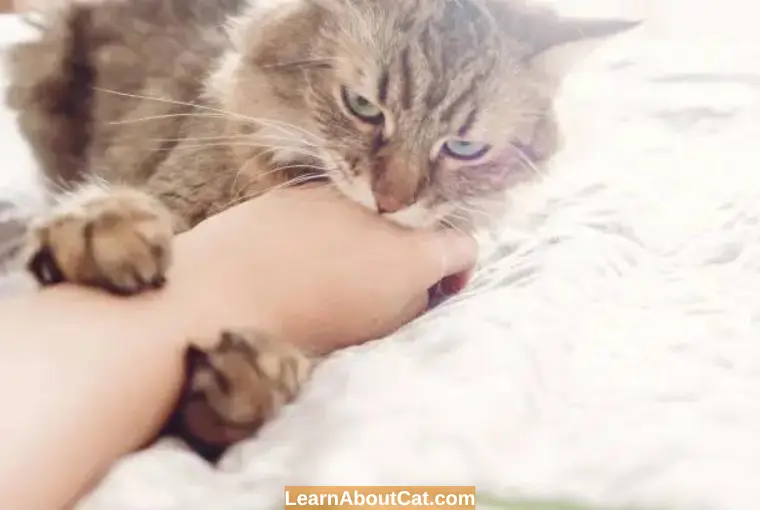
If you do the following steps, your cat won’t nip you any longer:
- Play With Your Kitten/Cat every day: To keep your cat from nipping your fingers in an effort to start a game, play with them regularly. When they are playing together, distract them with a toy and reach for your hands.
- Create a Calming Environment: cats who are stressed out aren’t happy cats. Make your house comfortable and any required modifications to the environment for your cat.
- Gave Theme Chew Toys: If your kittens are teething or you think your cat just likes the feeling of biting your fingers, try giving him a chew toy to nibble on. By doing this, they will see that you don’t want them to touch your fingertips.
- Understand Body Language: To identify overstimulation early, it’s important to comprehend the cues cats use to communicate emotions. You can never get over it once you know how they respond to petting.
- Stop Petting: If they display mildly overstimulating behaviours, such as flicking their tail or twitching their ears, stop petting them and step away. Make sure you pet your cat for a shorter amount of time than it takes for them to reach or surpass its tolerance threshold so that you can gradually identify what it is.
- Wash Your Hand: Always be sure to fully wash your hands with soap and water after handling any type of food. You can avoid your cat thinking that you are feeding it by doing this.
- Walk Away From Your Kitten/Cat: Get away from the cat and take your hand, yourself, and your attention with you if the nibble turns into a bite. The only way the cat will learn that he went above the limit is in this manner.
- Make sure you only leave your cat alone at home in a room that is cat-proof and clear of any other things or exposed electrical wires if you are aware that they like gnawing on objects.
Frequently Asked Questions
Why does my cat attack me when I’m not even trying to do anything?
Cats typically bite humans to let us know they want to stop interacting. Cats are prone to overstimulation because they have sensitive nerve endings all over their bodies. If you overlook other signs that they want to stop socialising, they can bite you.
Why does my cat bite me if I stop petting him?
Your cat could be trying to warn you that giving up would be a mistake. Your cat may bite once the petting sessions are over since they didn’t want them to end. They’re attempting to convince you to continue.
Why does my cat lick and chew my fingers?
Cats frequently lick and bite to interact with their surroundings, and these behaviours are frequently not caused for concern. Pay special attention when they lick or bite us since it is how they communicate their needs or emotions, whether to show affection, demand attention, or request alone time.
Why do cats get overstimulated when you pet them?
Even cats who enjoy being petted will become overstimulated if they receive too much petting. Some cats are more sensitive to overstimulation than others and may even react violently if the wrong stimulus is provided to them.
Should I punish my cat for nibbling on my fingers?
No, punishment is not an effective way to address this behaviour. Instead, try redirecting their attention or providing chew toys, and reward them when they exhibit positive behaviour.
why does my kitten nibble my fingers?
Kittens nibble on fingers for various reasons, including playfulness, teething, and exploration. In addition, kittens may use this behaviour as a means of establishing trust and affection with their owners. kittens play with their littermates, they often engage in gentle nibbling, and this behaviour can carry over to humans.
Wrap up!
There are many possibilities of why your feline buddy chews and then bites. You can determine which applies by studying additional signs, such as their body language and what was happening just before they bit you.
Try to teach your cat that biting your fingers is not acceptable, even if it appears harmless. The advice provided above will be useful in this respect but choose a solution that deals with the underlying issue for the greatest results.
However, if the behaviour is causing harm or injury, seeking advice from a professional is the best course of action.
Related Posts:
Who is Isabella?
My name is Isabella, and I am a dedicated and knowledgeable cat enthusiast. With years of experience caring for cats and a deep love for felines, I made a mission to help other cat lovers navigate the challenges of cat ownership.

